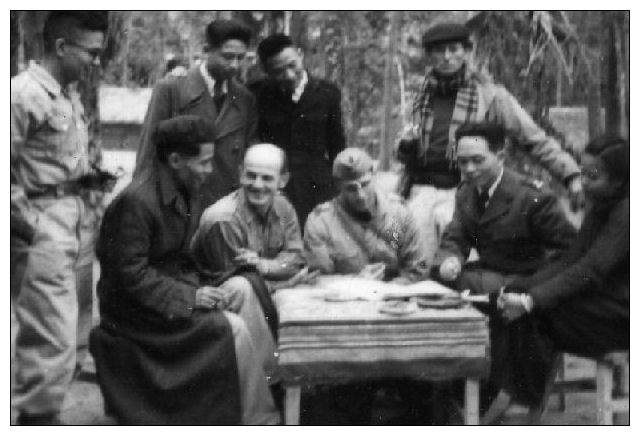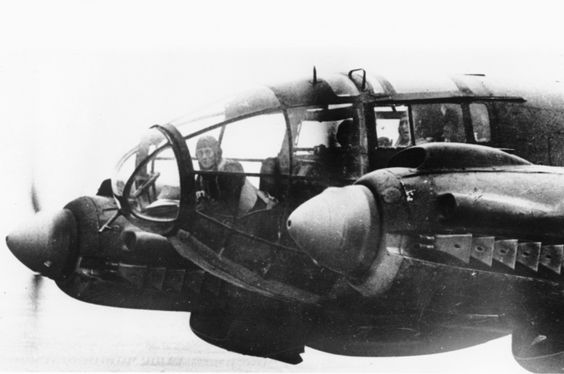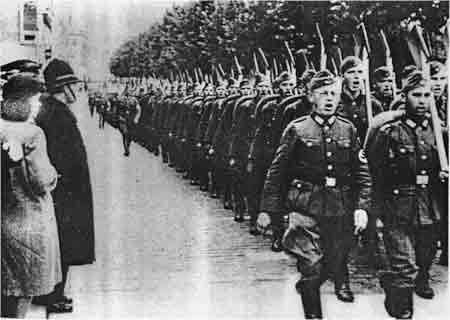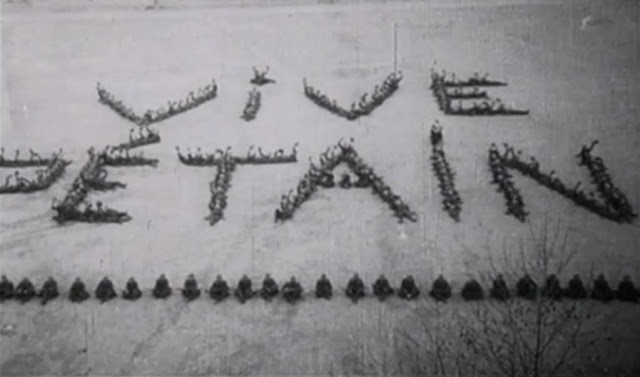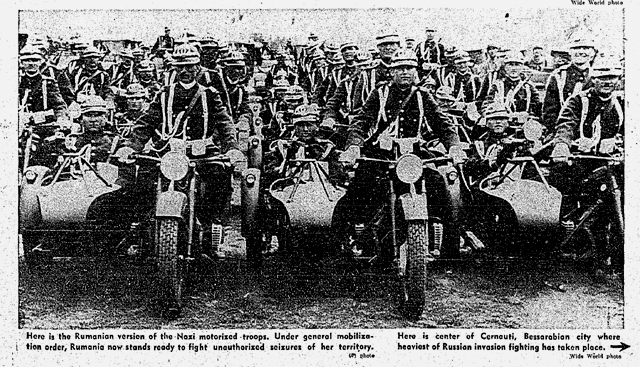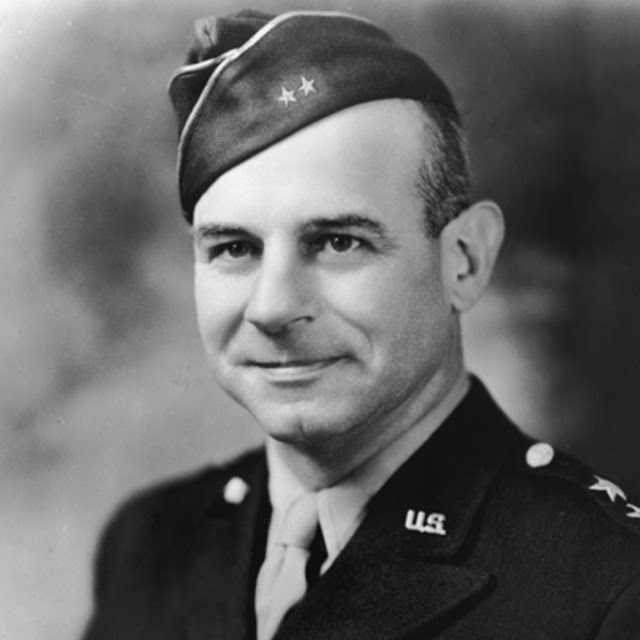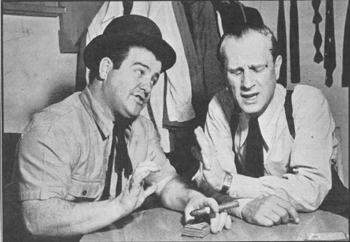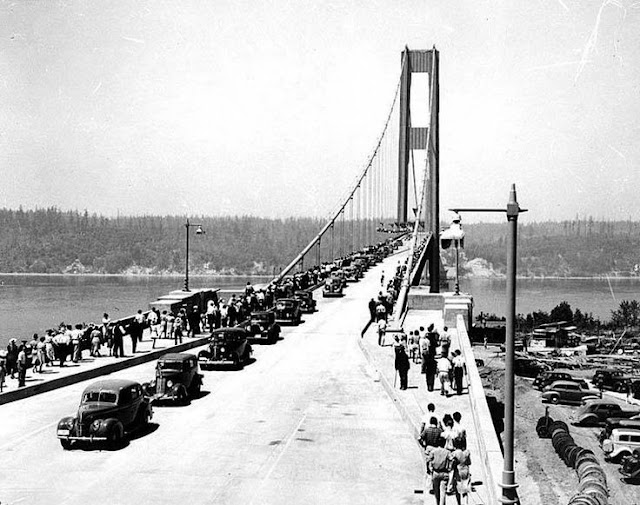Tuesday 28 January 1941
 |
| British tank officers in North Africa on January 28, 1941, read an Italian newspaper. The puppy was "captured" at Sidi Barrani. |
Italian/Greek Campaign: The Italians and Greeks continue to battle over the heights of Trebeshina (specifically Height 1923) on 28 January 1941. Two Italian Blackshirt battalions have recovered the peaks in appalling weather, while the Cretan 5th Division of II Corps is trying to dislodge them again. The Blackshirts, heavily indoctrinated political troops akin to the SS, are fighting strongly.
East African Campaign: In Eritrea, the Italian 4th Colonial Division under General Orlando Lorenzini is making a stand at Barentu Agordat. He has 76 guns and a company of both medium and light tanks, not an inconsiderable force in the area. Major-General Noel Beresford-Peirse, in command of the 4th Indian Division, sends his troops (3rd Battalion of the 14th Punjab Regiment) on a flanking move to the Cochen Hills to the south of the Italian defenses. Elsewhere, the British troops are advancing to catch up with the retreating Italians.
European Air Operations: The lousy winter weather continues to hamper air operations in northern Europe. The Luftwaffe continues its random nuisance raids on scattered targets in the southeast, dropping a few bombs dropped on London. The RAF raids the Naples airport, railway facilities, and marshaling yard. The bombers also attack Catania and Comiso airfields, the bases of Fliegerkorps X.
Battle of the Atlantic: The weather is extremely rough in the North Atlantic. This causes collisions, ship sightings that are hard to confirm, and similar issues. The Luftwaffe can't get enough planes in the air to provide proper scouting reports for the U-boats, due to the lack of sufficient Focke Wulf Fw 200 Condors in KG 40.
At about 06:49, Scharnhorst and Gneisenau, the two Kriegsmarine battlecruisers attempting to break out into the Atlantic to join Admiral Scheer, sight two British cruisers on radar patrolling south of Iceland. Admiral Lütjens, under strict orders not to engage capital ships, immediately turns around 180 degrees and heads back to the northeast. Hitler, in particular, is prone to giving his ship captains very cautious instructions which some feel unduly inhibit their discretion and opportunism. This time, Lütjens follows such orders, which is likely a good thing in this instance. Being too aggressive in the Atlantic can pay big rewards for German raiders - but it also, as will be seen in May 1941, be extremely hazardous to one's health. The entire British Home Fleet is at sea waiting in the general vicinity for the two German ships, and there would be a very little margin of error should a lucky Royal Navy hit slow them down or disable one of them.
The HMS Naiad also spots the two German ships at about the same time, but for some reason, the commander of the force - Admiral John Tovey - does not believe the lookouts. The Naiad thus does not shadow the German ships, but Tovey sends battlecruiser HMS Repulse and four destroyers to reinforce the two cruisers just in case. Admiral Lütjens does not intend to give up the mission but instead plans a rendezvous with tankers Adria and Schlettstadt in the far north near Bear Island and considers going north of Iceland instead of south.
Italian submarine Luigi Torelli torpedoes and sinks a straggler from Convoy HX 102 about 250 miles off Ireland in the Western Approaches. It is 5198-ton British freighter Urla. All 42 onboard survive.
The Luftwaffe (I,/KG 40 Focke Wulf Fw 200 Condors) bombs 1944 ton British freighter Pandion in the Northwest Approaches north of the westernmost points of Ireland. The ship makes it to Loch Swilly, where it anchors. However, the damage proves too great for the crew to handle. First, the crew beaches the ship, and later abandon it. The weather eventually destroys the ship entirely.
The Luftwaffe also bombs and sinks 4574-ton British freighter Mendip Grelrosa about 400 miles off Malin Head, Ireland in the Northwest Approaches. There are five deaths.
The Luftwaffe also bombs and damages 3635-ton British freighter Baron Renfrew in the same general area in the Northwest Approaches. The ship eventually makes it to Loch Lathaich and later to Glasgow for repairs.
British oil refinery ship 13,640-ton Tafelberg hits a mine and is badly damaged in Bristol Channel southwest of Cardiff. This area has seen numerous mine-strikes recently. The crew beaches the Tafelberg at Porthkerry but declared a total loss (it breaks in two). However, salvagers recover it and take it to Whitmore Bay, where the ship is completely rebuilt as tanker Empire Heritage.
Royal Navy corvette HMS Bluebell collides with the destroyer HMS Westcott in the Western Approaches. Both ships head for port, the Westcott's damage very minor but Bluebell's repairs at Cammell Laird taking until 4 March 1941.
Norwegian freighter Erling Jarl runs aground and sinks at Brønnøysund, Nordland. There is one death. The ship later is raised, repaired and renamed Bodø.
Responding to completely erroneous rumors that liner Empress of Australia has been sunk, the Admiralty decides to issue an odd statement that the ship is "safe in port."
Convoy OB 279 departs from Southend, Convoy AN 14 departs from Port Said for Piraeus,
Royal Navy submarine HMS Urchin is commissioned, the submarine HMS P-33 is launched, the destroyer HMS Pakenham is launched, corvettes HMS Mignonette and Myosotis are launched.
Dutch submarine O-12, sunk and refloated earlier in the war, is recommissioned as UD-2 in the Kriegsmarine.
U-411 is laid down.
Battle of the Mediterranean: At Derna, the Italians hold out throughout the day as Operation Compass grinds forward. However, the Australian 2/4th Battalion and British 7th Armored Division are threatening to cut the coast road. Rather than risk another catastrophe with the loss of the entire garrison, the Italian commanders order the evacuation of Derna during the night. While pulling out, the Italian Babini Group conducts a skillful retreat, harassing the advancing British troops, laying mines and wrecking the coast road. Italian artillery, situated north of Wad Derna, is particularly effective in slowing down the Australians and covering the retreat.
Elsewhere, the British consolidate at Mechili, which the Italians also abandoned. The issue is not one of tiredness or casualties, but more of fuel and supplies. The key supply port of Tobruk opened on the 27th, which will ease the supply situation going forward, but it will take time to resupply the troops, give the tanks proper maintenance, and the like. The Italians also are showing a bit more fight than they have before. In addition, the weather is lousy and heavy rain is causing issues.
Taking advantage of the start of a lull in the Libyan operations, British Middle East Commander General Wavell flies to Nairobi to discuss with General Cunningham plans for an offensive into Italian Somaliland. Wavell also meets with General Platt, commander of the forces entering Eritrea. Wavell will stay here for several days, leaving on 1 February.
Greek 5197 ton freighter Kate hits a mine and sinks in the Aegean.
Royal Navy submarine Upholder (Malcolm D. Wanklyn) torpedoes and damages 7389-ton German freighter Duisburg off Cape Bon, Tunisia. The Duisburg is towed into Tripoli. Wanklyn is one of the more enterprising Royal Navy submarine commanders.
Taking the Italian prisoners at Tobruk to prison camps once again becomes a major operation. Net layer HMS Protector sails from Suda Bay to bring prisoners from there to Alexandria.
Royal Navy submarine Rorqual lays 29 mines in the Adriatic off the port of Ancona.
The weather at Malta is overcast and it is a quiet day. While fears remain high about a planned German invasion from Sicily, reports from spies and observers (such as Americans) are mixed about what may actually be going on there.
Anglo/US Relations: Having read and pondered the handwritten note from President Roosevelt brought to him by Wendell Willkie, British Prime Minister Winston Churchill writes a lengthy "Personal and Secret" response. He notes the following:
US Military: Secretary of War Henry L. Stimson approves the construction of 12 detector radar stations in Alaska. Originally, the plan was for 8 locations, but a survey found that five of those sites were unacceptable and, in fact, a dozen sites were necessary. All of the sites are south of Cape Prince of Wales. Both Japan and the US fear an air attack using the Aleutian island chain, so these stations are oriented toward Japan, not the USSR. Commander General DeWitt of the Ninth Corps Area and Fourth Army is in charge of construction, while Colonel Simon Bolivar Buckner, Jr. is in charge of US troops in Alaska. Troops are being slowly inserted into Alaskan naval bases such as Sitka, Kodiak and Dutch Harbor due to rising war fears with Japan.
German Military: General Keitel meets with Hitler and gives him the conclusion of the OKH (army high command) regarding Operation Felix (invasion of Gibraltar). They believe that:
Two hundred Norwegian volunteers, recruited by the SS, swear an oath of allegiance to Hitler. These Norwegian volunteers are to serve in the "Wiking" Division. They will be part of Army Group South, heading toward the Ukraine, where numerous atrocities will take place (of course, atrocities will take place across the entire front). Reichsfuhrer-SS Heinrich Himmler watches with approval.
British Government: Home Secretary Herbert Morrison appears before the House of Commons to defend his recent closure of the Daily Worker and other communist publications. He claims that the publication has been blaming the government for deaths from air raids, which Morrison claims is "cruel and cynical, sheer sniveling hypocrisy." The MPs support the move as removing a subversive element of the press. Support is not unanimous, with Labour MP Aneurin Bevan claiming it was an unjustified restriction on the press, but the move carries 297-11.
Minister of Food Robert Boothby gives a speech in the House as well, defending himself against charges of self-dealing. Churchill rises and reflects upon this "heartbreaking business" without really taking a position. In a note to his son Randolph, Churchill states that Boothby's speech was "a remarkable parliamentary performance." The House continues to consider the matter.
Indochina: The Thai 50th Bomber Squadron bombs Sisophon, Cambodia with B-10 medium bombers. This is the last significant action of the brief border campaign between French Indochina and Thailand. This raid induces the Vichy French somewhat belatedly to agree to mediation by Japan, an offer previously accepted with some alacrity by Thailand. There is no question - from the outcome - which side Japan favors in this border war. An effective but unofficial ceasefire now takes place, which is formalized later. Negotiations proceed aboard Japanese battleship IJN Natori, anchored off Saigon.
Ho Chi Minh (Nguyễn Ái Quốc), a committed Chinese communist of Vietnamese descent who has studied in Europe, returns to Indochina today after 30 years overseas. Ho at first lives in a cave in Pac Bo and sets to work preparing for the Indochinese Communist Party (ICP) 8th Party Congress. His ultimate goal is to form an organization eventually called the Vietnam Doc Lap Dong Minh Hoi (Vietnam Independence League), or Viet Minh. The Viet Minh is a Communist front organization to organize resistance against French colonial rule and occupying Japanese forces. It ostensibly is more nationalist than communist (in order to appeal to a wider audience), and equally, voices outrage about "French jackals" and the "Japanese fascists." However, Ho's ICP actually controls the Viet Minh behind the scenes. Having learned from his experiences in China, Ho successfully stresses the unity of opposition within Indochina to achieve independence, contrary to the infighting between the Kuomintang and the Communists in China which hampers their opposition to the Japanese.
This date of 28 January - unremarked in the Western world - is considered to be a very significant date in Vietnam today, with various official commemorative meetings held on the anniversary.
American Homefront: "The Pepsodent Show" aka "The Pepsodent Radio Show Starring Bob Hope" aka "The Bob Hope Show" features Basil Rathbone today.
January 2, 1941: Camp Categories
January 3, 1941: Liberty Ships
January 4, 1941: Aussies Take Bardia
January 5, 1941: Amy Johnson Perishes
January 6, 1941: Four Freedoms
January 7, 1941: Pearl Harbor Plans
January 8, 1941: Billions For Defense
January 9, 1941: Lancasters
January 10, 1941: Malta Convoy Devastation
January 11, 1941: Murzuk Raid
January 12, 1941: Operation Rhubarb
January 13, 1941: Plymouth Blitzed
January 14, 1941: V for Victory
January 15, 1941: Haile Selassie Returns
January 16, 1941: Illustrious Blitz
January 17, 1941: Koh Chang Battle
January 18, 1941: Luftwaffe Pounds Malta
January 19, 1941: East African Campaign Begins
January 20, 1941: Roosevelt 3rd Term
January 21, 1941: Attack on Tobruk
January 22, 1941: Tobruk Falls
January 23, 1941: Pogrom in Bucharest
January 24, 1941: Tank Battle in Libya
January 25, 1941: Panjiayu Tragedy
January 26, 1941: Churchill Working Hard
January 27, 1941: Grew's Warning
January 28, 1941: Ho Chi Minh Returns
January 29, 1941: US Military Parley With Great Britain
January 30, 1941: Derna Taken
January 31, 1941: LRDG Battered
2020
East African Campaign: In Eritrea, the Italian 4th Colonial Division under General Orlando Lorenzini is making a stand at Barentu Agordat. He has 76 guns and a company of both medium and light tanks, not an inconsiderable force in the area. Major-General Noel Beresford-Peirse, in command of the 4th Indian Division, sends his troops (3rd Battalion of the 14th Punjab Regiment) on a flanking move to the Cochen Hills to the south of the Italian defenses. Elsewhere, the British troops are advancing to catch up with the retreating Italians.
European Air Operations: The lousy winter weather continues to hamper air operations in northern Europe. The Luftwaffe continues its random nuisance raids on scattered targets in the southeast, dropping a few bombs dropped on London. The RAF raids the Naples airport, railway facilities, and marshaling yard. The bombers also attack Catania and Comiso airfields, the bases of Fliegerkorps X.
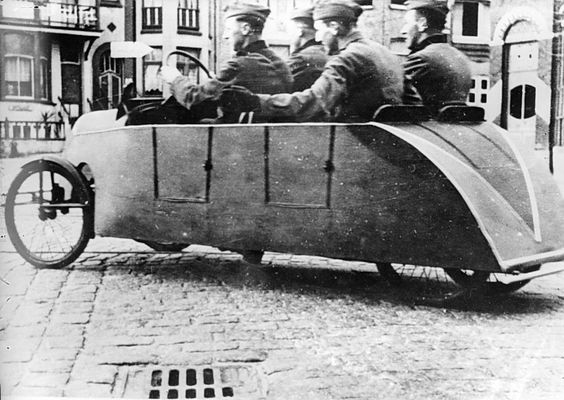 |
| A carload of Germans pedals their way through the Bailiwick of Jersey on 28 January 1941. "To save petrol German soldiers use a pedal car to get around in town." (Photo- Keystone Photo Agency). |
At about 06:49, Scharnhorst and Gneisenau, the two Kriegsmarine battlecruisers attempting to break out into the Atlantic to join Admiral Scheer, sight two British cruisers on radar patrolling south of Iceland. Admiral Lütjens, under strict orders not to engage capital ships, immediately turns around 180 degrees and heads back to the northeast. Hitler, in particular, is prone to giving his ship captains very cautious instructions which some feel unduly inhibit their discretion and opportunism. This time, Lütjens follows such orders, which is likely a good thing in this instance. Being too aggressive in the Atlantic can pay big rewards for German raiders - but it also, as will be seen in May 1941, be extremely hazardous to one's health. The entire British Home Fleet is at sea waiting in the general vicinity for the two German ships, and there would be a very little margin of error should a lucky Royal Navy hit slow them down or disable one of them.
The HMS Naiad also spots the two German ships at about the same time, but for some reason, the commander of the force - Admiral John Tovey - does not believe the lookouts. The Naiad thus does not shadow the German ships, but Tovey sends battlecruiser HMS Repulse and four destroyers to reinforce the two cruisers just in case. Admiral Lütjens does not intend to give up the mission but instead plans a rendezvous with tankers Adria and Schlettstadt in the far north near Bear Island and considers going north of Iceland instead of south.
Italian submarine Luigi Torelli torpedoes and sinks a straggler from Convoy HX 102 about 250 miles off Ireland in the Western Approaches. It is 5198-ton British freighter Urla. All 42 onboard survive.
The Luftwaffe (I,/KG 40 Focke Wulf Fw 200 Condors) bombs 1944 ton British freighter Pandion in the Northwest Approaches north of the westernmost points of Ireland. The ship makes it to Loch Swilly, where it anchors. However, the damage proves too great for the crew to handle. First, the crew beaches the ship, and later abandon it. The weather eventually destroys the ship entirely.
The Luftwaffe also bombs and sinks 4574-ton British freighter Mendip Grelrosa about 400 miles off Malin Head, Ireland in the Northwest Approaches. There are five deaths.
The Luftwaffe also bombs and damages 3635-ton British freighter Baron Renfrew in the same general area in the Northwest Approaches. The ship eventually makes it to Loch Lathaich and later to Glasgow for repairs.
British oil refinery ship 13,640-ton Tafelberg hits a mine and is badly damaged in Bristol Channel southwest of Cardiff. This area has seen numerous mine-strikes recently. The crew beaches the Tafelberg at Porthkerry but declared a total loss (it breaks in two). However, salvagers recover it and take it to Whitmore Bay, where the ship is completely rebuilt as tanker Empire Heritage.
Royal Navy corvette HMS Bluebell collides with the destroyer HMS Westcott in the Western Approaches. Both ships head for port, the Westcott's damage very minor but Bluebell's repairs at Cammell Laird taking until 4 March 1941.
Norwegian freighter Erling Jarl runs aground and sinks at Brønnøysund, Nordland. There is one death. The ship later is raised, repaired and renamed Bodø.
Responding to completely erroneous rumors that liner Empress of Australia has been sunk, the Admiralty decides to issue an odd statement that the ship is "safe in port."
Convoy OB 279 departs from Southend, Convoy AN 14 departs from Port Said for Piraeus,
Dutch submarine O-12, sunk and refloated earlier in the war, is recommissioned as UD-2 in the Kriegsmarine.
U-411 is laid down.
 |
| Recruiting poster for the SS in Norway. |
Elsewhere, the British consolidate at Mechili, which the Italians also abandoned. The issue is not one of tiredness or casualties, but more of fuel and supplies. The key supply port of Tobruk opened on the 27th, which will ease the supply situation going forward, but it will take time to resupply the troops, give the tanks proper maintenance, and the like. The Italians also are showing a bit more fight than they have before. In addition, the weather is lousy and heavy rain is causing issues.
Taking advantage of the start of a lull in the Libyan operations, British Middle East Commander General Wavell flies to Nairobi to discuss with General Cunningham plans for an offensive into Italian Somaliland. Wavell also meets with General Platt, commander of the forces entering Eritrea. Wavell will stay here for several days, leaving on 1 February.
Greek 5197 ton freighter Kate hits a mine and sinks in the Aegean.
Royal Navy submarine Upholder (Malcolm D. Wanklyn) torpedoes and damages 7389-ton German freighter Duisburg off Cape Bon, Tunisia. The Duisburg is towed into Tripoli. Wanklyn is one of the more enterprising Royal Navy submarine commanders.
Taking the Italian prisoners at Tobruk to prison camps once again becomes a major operation. Net layer HMS Protector sails from Suda Bay to bring prisoners from there to Alexandria.
Royal Navy submarine Rorqual lays 29 mines in the Adriatic off the port of Ancona.
The weather at Malta is overcast and it is a quiet day. While fears remain high about a planned German invasion from Sicily, reports from spies and observers (such as Americans) are mixed about what may actually be going on there.
Anglo/US Relations: Having read and pondered the handwritten note from President Roosevelt brought to him by Wendell Willkie, British Prime Minister Winston Churchill writes a lengthy "Personal and Secret" response. He notes the following:
- "All my information shows that the Germans are persevering in their preparations to invade this country";
- "[A]dvance parties of the German air force have already to the extent of several thousand infiltrated themselves into Bulgaria";
- "[Hitler] could carry out both offensives [in the East and against Britain] at the same time."
US Military: Secretary of War Henry L. Stimson approves the construction of 12 detector radar stations in Alaska. Originally, the plan was for 8 locations, but a survey found that five of those sites were unacceptable and, in fact, a dozen sites were necessary. All of the sites are south of Cape Prince of Wales. Both Japan and the US fear an air attack using the Aleutian island chain, so these stations are oriented toward Japan, not the USSR. Commander General DeWitt of the Ninth Corps Area and Fourth Army is in charge of construction, while Colonel Simon Bolivar Buckner, Jr. is in charge of US troops in Alaska. Troops are being slowly inserted into Alaskan naval bases such as Sitka, Kodiak and Dutch Harbor due to rising war fears with Japan.
 |
| Heinrich Himmler in Norway, January 1941. Aside from work, Himmler dabbles in his theories about the origin of the Aryan Race during this visit (Mobius, Federal Archive). |
[I]n the event of preparations being resumed on 1 February, the attack on Gibraltar was not possible before the middle of April and that therefore the forces envisaged for this operation would not be available in time for 'Barbarossa.'Hitler may wish to invade Gibraltar, but he wants to invade the Soviet Union more. Accordingly, he states that "Operation Felix will have to be dropped because it was impossible to create the political prerequisites." While Hitler continues to cajole Franco into joining the Axis and permitting Operation Felix, a project which remains on the docket for years (like Operation Sealion), this marks the death knell for the planned operation.
Two hundred Norwegian volunteers, recruited by the SS, swear an oath of allegiance to Hitler. These Norwegian volunteers are to serve in the "Wiking" Division. They will be part of Army Group South, heading toward the Ukraine, where numerous atrocities will take place (of course, atrocities will take place across the entire front). Reichsfuhrer-SS Heinrich Himmler watches with approval.
British Government: Home Secretary Herbert Morrison appears before the House of Commons to defend his recent closure of the Daily Worker and other communist publications. He claims that the publication has been blaming the government for deaths from air raids, which Morrison claims is "cruel and cynical, sheer sniveling hypocrisy." The MPs support the move as removing a subversive element of the press. Support is not unanimous, with Labour MP Aneurin Bevan claiming it was an unjustified restriction on the press, but the move carries 297-11.
Minister of Food Robert Boothby gives a speech in the House as well, defending himself against charges of self-dealing. Churchill rises and reflects upon this "heartbreaking business" without really taking a position. In a note to his son Randolph, Churchill states that Boothby's speech was "a remarkable parliamentary performance." The House continues to consider the matter.
 |
| An official painting memorializing Ho Chi Minh's return to Indochina today. |
Ho Chi Minh (Nguyễn Ái Quốc), a committed Chinese communist of Vietnamese descent who has studied in Europe, returns to Indochina today after 30 years overseas. Ho at first lives in a cave in Pac Bo and sets to work preparing for the Indochinese Communist Party (ICP) 8th Party Congress. His ultimate goal is to form an organization eventually called the Vietnam Doc Lap Dong Minh Hoi (Vietnam Independence League), or Viet Minh. The Viet Minh is a Communist front organization to organize resistance against French colonial rule and occupying Japanese forces. It ostensibly is more nationalist than communist (in order to appeal to a wider audience), and equally, voices outrage about "French jackals" and the "Japanese fascists." However, Ho's ICP actually controls the Viet Minh behind the scenes. Having learned from his experiences in China, Ho successfully stresses the unity of opposition within Indochina to achieve independence, contrary to the infighting between the Kuomintang and the Communists in China which hampers their opposition to the Japanese.
This date of 28 January - unremarked in the Western world - is considered to be a very significant date in Vietnam today, with various official commemorative meetings held on the anniversary.
American Homefront: "The Pepsodent Show" aka "The Pepsodent Radio Show Starring Bob Hope" aka "The Bob Hope Show" features Basil Rathbone today.
January 1941
January 1, 1941: Muselier ArrestedJanuary 2, 1941: Camp Categories
January 3, 1941: Liberty Ships
January 4, 1941: Aussies Take Bardia
January 5, 1941: Amy Johnson Perishes
January 6, 1941: Four Freedoms
January 7, 1941: Pearl Harbor Plans
January 8, 1941: Billions For Defense
January 9, 1941: Lancasters
January 10, 1941: Malta Convoy Devastation
January 11, 1941: Murzuk Raid
January 12, 1941: Operation Rhubarb
January 13, 1941: Plymouth Blitzed
January 14, 1941: V for Victory
January 15, 1941: Haile Selassie Returns
January 16, 1941: Illustrious Blitz
January 17, 1941: Koh Chang Battle
January 18, 1941: Luftwaffe Pounds Malta
January 19, 1941: East African Campaign Begins
January 20, 1941: Roosevelt 3rd Term
January 21, 1941: Attack on Tobruk
January 22, 1941: Tobruk Falls
January 23, 1941: Pogrom in Bucharest
January 24, 1941: Tank Battle in Libya
January 25, 1941: Panjiayu Tragedy
January 26, 1941: Churchill Working Hard
January 27, 1941: Grew's Warning
January 28, 1941: Ho Chi Minh Returns
January 29, 1941: US Military Parley With Great Britain
January 30, 1941: Derna Taken
January 31, 1941: LRDG Battered
2020
